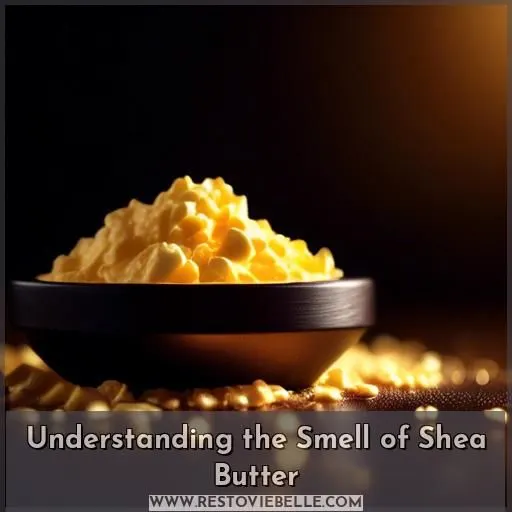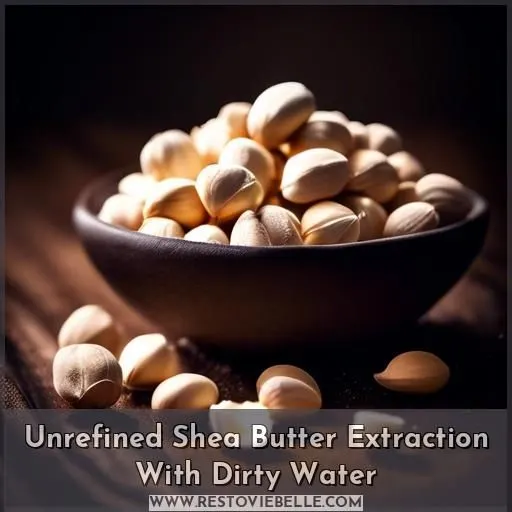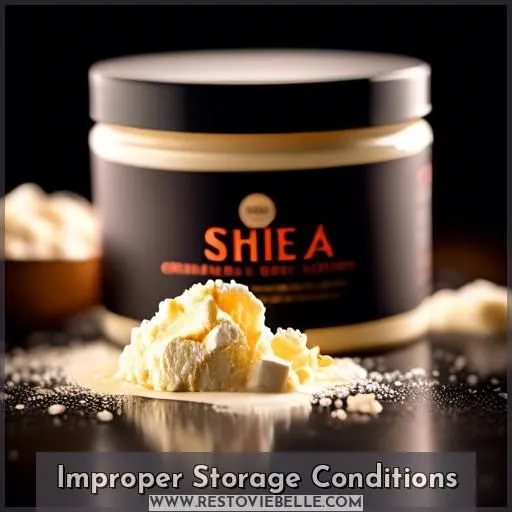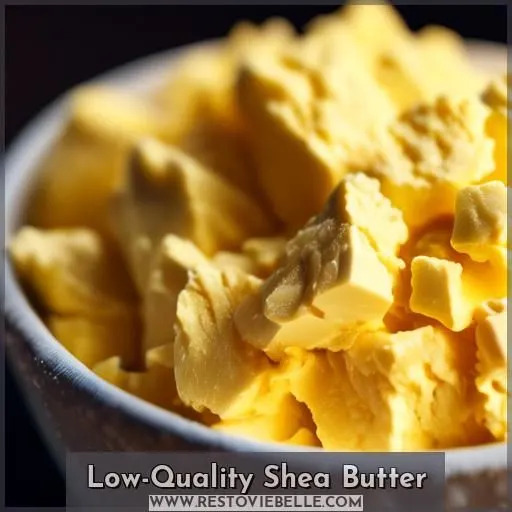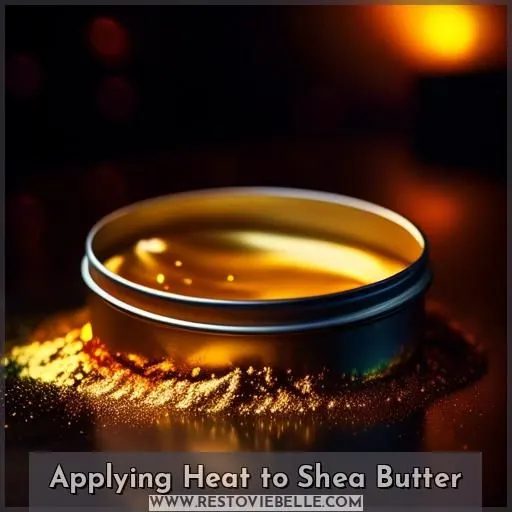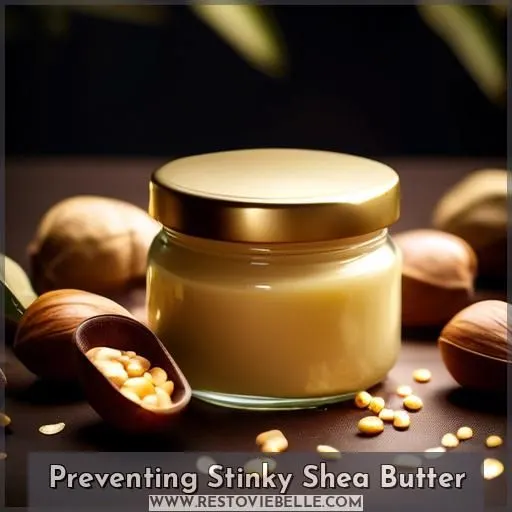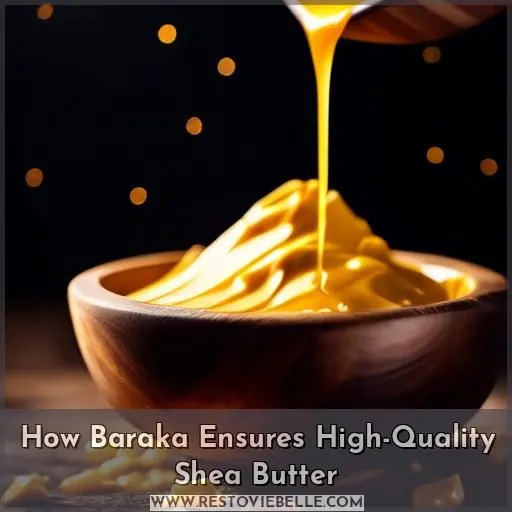This site is supported by our readers. We may earn a commission, at no cost to you, if you purchase through links.
Shea butter possesses an inherent nutty aroma. However, if an unpleasant odor is detected, it may be attributed to contaminants resulting from unrefined extraction, inadequate storage conditions, subpar shea butter, or thermal damage.
To mitigate this, preserve your shea butter in an airtight container within a cool, low-light environment. If the odor persists, contemplate acquiring purified shea butter.
Baraka maintains high-quality shea butter through the utilization of conventional methods, just compensation, and meticulous inspection.
Table Of Contents
- Key Takeaways
- Why Does Shea Butter Smell?
- Unrefined Shea Butter Extraction With Dirty Water
- Improper Storage Conditions
- Low-Quality Shea Butter
- Applying Heat to Shea Butter
- Preventing Stinky Shea Butter
- How Baraka Ensures High-Quality Shea Butter
- Frequently Asked Questions (FAQs)
- How does the extraction process affect the smell of shea butter?
- What are the best storage conditions to prevent the smell of rancid shea butter?
- How does the refining process affect the smell of shea butter?
- What are the common causes of a strong odor in shea butter?
- How can essential oils be used to improve the smell of shea butter?
- Conclusion
Key Takeaways
- Shea butter has a natural nutty aroma, but an unpleasant odor can be caused by contaminants, improper storage, low-quality butter, or heat damage.
- To maintain the quality of shea butter, it should be stored in an airtight container in a cool, low-light environment.
- Unrefined shea butter extraction using dirty water can lead to impurities and a low-quality final product.
- Baraka maintains high-quality shea butter through traditional methods, fair compensation, and meticulous inspection.
Why Does Shea Butter Smell?
Shea butter is extracted from the nuts of the shea tree, which gives it a natural, nutty scent. The scent can range from mild to wild and earthy, depending on the quality of the product.
If shea butter has a rancid odor, it is likely due to expiration or poor storage conditions, such as exposure to heat, light, moisture, or air. To prevent the rancid smell, shea butter should be stored in an airtight container in a cool, dark place.
Unrefined Shea Butter Extraction With Dirty Water
Unrefined shea butter extraction using dirty water can lead to impurities in the final product, resulting in low-quality shea butter. The traditional method of extracting shea butter involves washing the extracted fat with water, which can leave behind impurities if the water isn’t properly filtered or if the extraction process isn’t carefully controlled.
These impurities can affect the quality of the shea butter, potentially leading to an unpleasant smell and reduced shelf life. To guarantee high-quality unrefined shea butter, it’s essential to use clean water during the extraction process and to carefully filter the extracted fat to remove any impurities.
This will help to maintain the natural odor and shelf life of the shea butter, providing customers with a high-quality product they can trust.
Improper Storage Conditions
Improper storage conditions can lead to mold growth, chemical contamination, bacteria development, oxidation damage, and moisture absorption in shea butter. Rancid shea butter develops a pungent, stinky smell and sticky texture.
To prevent this, store shea butter in a cool, dark place, an airtight container, or even in the refrigerator. Heating shea butter can also cause it to become rancid more quickly.
Always make sure that your raw shea butter is stored properly to maintain its natural nutty smell and high-quality texture.
Low-Quality Shea Butter
Moving from the subtle complexities of storing, let’s venture into the questionable domain of substandard shea butter. It’s a gradual decline from natural scent to a chemical onslaught in your skincare regimen.
- Inferior shea nuts are the culprits behind that unpleasant aroma, a telltale sign of the genuine product you seek.
- Synthetic additives infiltrate the mixture, diminishing the very essence of what makes unprocessed shea butter so precious.
- Shea seeds mishandled during the production process result in a product that’s more deceptive than desirable.
Applying Heat to Shea Butter
Heating shea butter can have a marked impact on its aroma, consistency, and lifespan. Elevated temperatures can induce rancidity, leading to a sour, acrid, or stale odor. This deterioration can also alter its hue and texture, rendering it sticky and unwieldy. To avert such undesirable consequences, it’s imperative to safeguard shea butter in a cool, shaded location and employ an airtight vessel to shield it from exposure to air and light. Additionally, cryogenic preservation can prolong its shelf life by decelerating the oxidative process.
When aerating shea butter, it’s paramount to meticulously regulate the temperature and duration during the liqtion and solidification phases. Excessive heat can render the butter excessively pliable or even fully melt it, while insufficient heat can result in a gritty texture. Incorporating essential oils into whipped shea butter can help neutralize any disagreeable scents, but moderation is key. Avoid exposing them to heat to preclude potential toxicity.
Preventing Stinky Shea Butter
Preventing odorous shea butter is a critical aspect of maintaining its integrity and maximizing its advantages. Here are four methods to accomplish this:
- Procuring premium shea nuts: Verify that the shea nuts utilized are of the finest quality. This entails acquiring them from respected suppliers who prioritize ethical and equitable practices.
- Granting women ample time: Compensating women who extract shea butter fairly enables them to dedicate time to producing high-grade products.
- Adequate storage: Store shea butter in a cool, shaded location or refrigerator to prevent it from spoiling.
- Avoiding elevated temperatures: Refrain from subjecting shea butter to heat as it can result in an unpleasant odor and texture.
How Baraka Ensures High-Quality Shea Butter
Baraka Shea Butter is renowned for its exceptional quality. Here’s how they guarantee it:
- Traditional Techniques: Baraka’s producers use traditional methods, passed down through generations, to create their shea butter.
- Women’s Pride: Fair prices paid to women allow them to take their time, resulting in high-quality products.
- Baraka’s Standards: Every carton of Baraka Shea Butter is hand inspected to meet their stringent standards.
- Shea Butter Inspection: This rigorous inspection process guarantees a 100% 5-star rating, making Baraka Shea Butter a trusted choice for customers seeking the healing properties of shea butter.
Frequently Asked Questions (FAQs)
How does the extraction process affect the smell of shea butter?
The extraction process has a profound impact on the aroma of shea butter. Conventional methods, such as water extraction, entail boiling the shea nuts in water and collecting the released oil from the surface, which possesses a characteristic nutty fragrance.
Mechanical expeller pressing and solvent extraction produce purified shea butter with minimal or no odor due to the elimination of natural scents. However, these refining techniques may also remove some of shea’s advantageous bioactive components as well as undesirable colors and odors.
What are the best storage conditions to prevent the smell of rancid shea butter?
To dodge the rancid shea butter blues, stash it in a cool, dark spot in an airtight container. Think of it as your butter’s cozy cave away from the world’s chaos.
How does the refining process affect the smell of shea butter?
Refining shea butter strips away its natural, sometimes nutty odor, leaving it virtually scent-free, which is a relief if you’re not a fan of smelling like a snack all day.
What are the common causes of a strong odor in shea butter?
The common causes of a strong odor in shea butter are poor storage conditions, rancidity, and the natural smell of unrefined shea butter. Unrefined shea butter has a nutty smell due to its extraction from the nuts of the shea tree, which can vary from mild to wild, earthy scents.
Rancid shea butter develops a foul smell and sticky texture when it becomes rancid quickly. To prevent this, fair prices are paid to women to allow them to take their time in making the shea butter, and the liquid is strained and filtered to remove impurities.
Producers take pride in their work and leave their handprint on cartons, ensuring high-quality products.
How can essential oils be used to improve the smell of shea butter?
Shea butter naturally has a nutty smell, but it can be improved by adding essential oils. To mask the smell of shea butter, you can experiment with essential oils like lavender or peppermint. Start with a small amount and gradually increase until you achieve the desired scent. Essential oils can be added after whipping the shea butter, and it’s recommended to use a hand-held mixer for whipping. Be sure to follow essential oil safety guidelines, such as diluting them with a carrier oil and avoiding ingestion.
Shea butter has a natural nutty aroma. To mask this scent, you can add essential oils like lavender or peppermint. Begin with a small amount of essential oil and gradually increase the quantity until you reach the desired fragrance. It’s best to add the essential oils after whipping the shea butter, and using a hand-held mixer is recommended for this process. When working with essential oils, it’s important to follow safety guidelines, such as diluting them with a carrier oil and avoiding ingestion.
Conclusion
Explore the vibrant, nutty scent of shea butter, a natural treasure that nourishes and safeguards. However, an unsavory odor may signal impurities from unpolished extraction, improper preservation, substandard butter, or heat damage.
To maintain its fragrance and excellence, store shea butter in a sealed container in a cool, dimly lit environment. For an odorless experience, think about refined shea butter.
Baraka’s dedication to traditional techniques, equitable compensation, and quality inspections guarantees a superior product.

